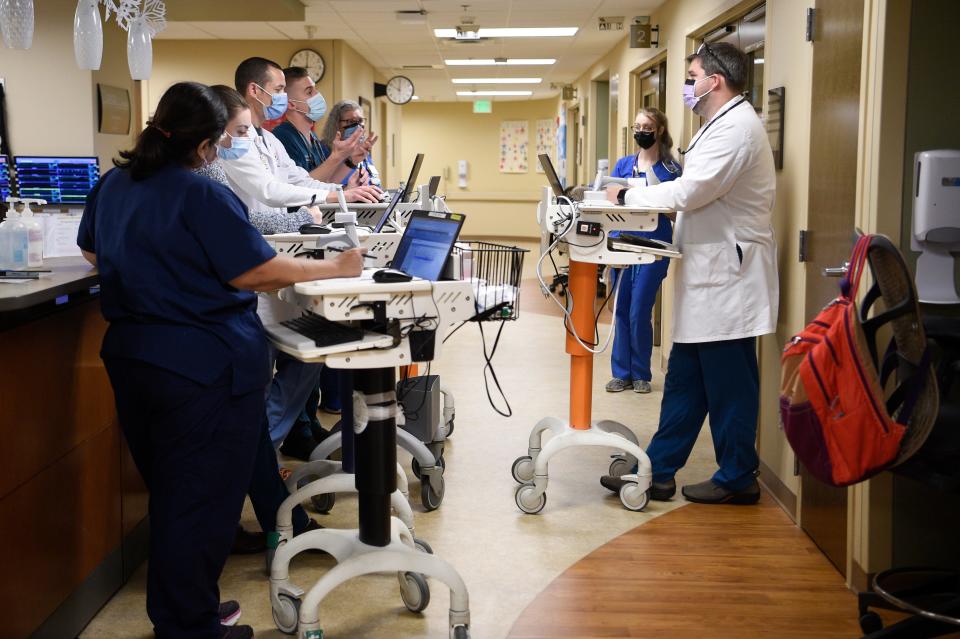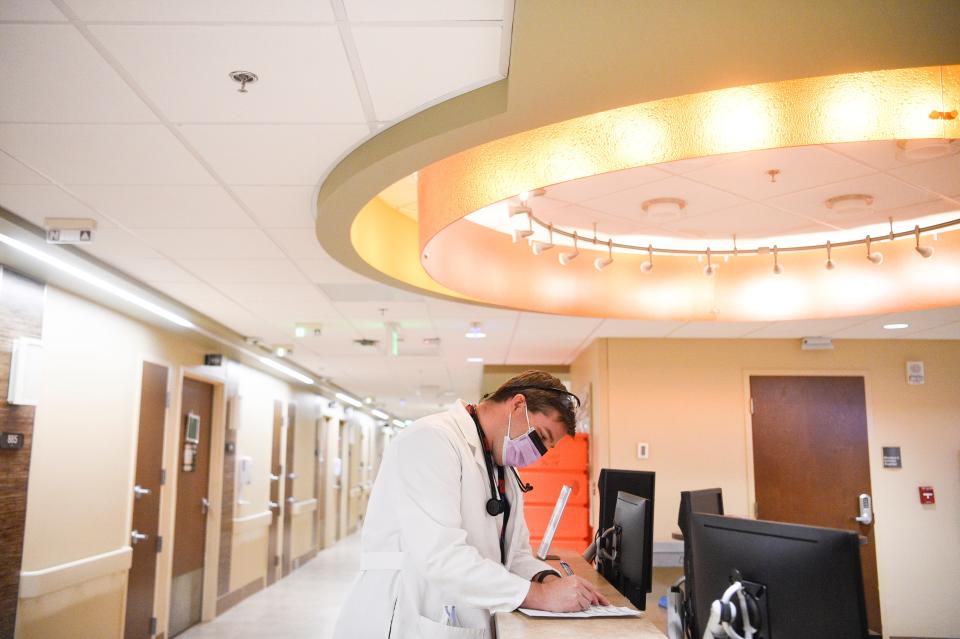ECMO treatment at UT Medical Center offers real hope to the sickest COVID-19 patients
- Oops!Something went wrong.Please try again later.
University of Tennessee Medical Center staffers are saving the lives of East Tennesseans fighting COVID-19 through a new treatment that's in very high demand.
Nearly a year after the pandemic made its way to the United States, the hospital added three extracorporeal membrane oxygenation machines to its toolkit. The process is slow because patients are treated for weeks, and only certain types of people are candidates, but it gives doctors hope that gravely sick people will actually walk out the hospitals' doors.
ECMO machines aren't new. They essentially work for the patient’s heart and lungs. A multidisciplinary team of health care providers monitors the machine as it pumps blood from the patient’s body to an artificial lung that adds oxygen and removes carbon dioxide.
As doctors learned more about the pandemic's effects, they realized ECMO could benefit some of the sickest COVID-19 patients. The treatment doesn't fight the virus itself but provides organ support while the team treats the underlying disease.
And with COVID-19 continuing to spread rapidly in the U.S. after the holidays, this treatment could be in even more demand in the next few weeks.
The new COVID-19 variant omicron is is making people sick faster, according to a study by the Centers for Disease Control and Prevention, although most cases of omicron appear to be relatively mild.

Dr. Julia van Zyl, a hospitalist at the UT Medical Center, says "ECMO could be used for a patient with omicron variant COVID-19 if the situation is appropriate."
Part of the reason the treatment is in high demand is that UT Medical Center can only treat two patients with ECMO at a time (one machine is a failsafe). Treatment can last up to a month, and doctors spend a lot of time weighing the risks of the treatment.
"It's just taking people longer to recover if they're going to recover," said Dr. Ben Bevill, medical director of the ECMO program.
COVID-19 NUMBERS: Knox County COVID-19 case counts and vaccine numbers
COVID-19 UPDATE: Omicron variant surges through Knox County at unprecedented rate
COVID-19 VACCINE: Need to get your family vaccinated? Here's a fun way to do it in Knoxville
Previously, patients needing ECMO therapy were transferred to Nashville or Atlanta for advanced care. Bevill says the treatment has been primarily used for patients with COVID-19 since it came to Knoxville.
"That's been the demand not only here, but across the nation, and really the world," Bevill said. "It is a very time-consuming support system. It's very labor-intensive and staff-intensive. And in the midst of a pandemic, when all of this stuff is going on, supporting these people has been very satisfying, but also very, very difficult at the same time."
The new program didn't come without its challenges. Kasey Beem, a part-time medical ICU nurse and part-time ECMO specialist, has been working in the program since the beginning.

"Every new program has its growing pains," Beem said. "We had some huge support from higher up, but it was a new treatment for all of us."
Despite the challenges, the treatment has transformed patient care.
"It is gratifying to be able to get to see how some of these people can succeed when we didn't think that they would have another chance, which is what ECMO has allowed us to do," Bevill said.
But ECMO is not for everyone, Bevill says. There are several reasons why someone might not be a good candidate for the therapy. People without underlying health conditions typically do well on ECMO, according to Bevill.
"One of the biggest challenges that we face is deciding who we can support," Bevill said. "It has been a frequent issue that there are no available machines for people. ... They may be a candidate, but there's nowhere for them to go. And it's not just here, it's all over the Southeast all over the country even."
Many of those best candidates are the younger COVID-19 patients that UT Medical Center continues to treat.
"It's kind of like scary and it's really hard to see somebody that's younger than I am," Beem said. "And even if we can pull them through this, what is that going to make the rest of their life look like? That's really just traumatizing. ... This is going to affect them for the rest of their life, whether it's shorter or longer, no matter what's going on, just because of how COVID has affected people."
Patients can expect to be on the machine for about 20 to 30 days, which is part of why the therapy is so scarce.
"A lot of people think that it's the miracle cure," Bevill said. "But it's not — it's a support device. And it comes with risks, obviously. In medicine, (everything) we do is weighing the risks and benefits of each thing that we do, and that's exactly what we're doing when we when we decide to put somebody on ECMO."
Back in October, Beem said it wasn't uncommon to lose two or three patients on her floor in a day.
"I can't say everybody is gonna get better," Beem said. But when the ECMO unit has successful recoveries, everybody celebrates.
"One of our first ECMO patients, I don't know how long he was in the hospital, but he did end up getting out," Beem said. "I just remember wheeling him out and just crying because that was something that, as an ICU COVID nurse, I hadn't seen people get out and actually discharged home. ... That was amazing, as an ECMO and COVID ICU nurse, we were able to do that and give him back to his family."
For health care professionals like Bevill and Beem, those recoveries are what helps get them through the day.
"Just seeing the fact that we can help people has brought me hope," Bevill said. "You know, the ICU is full of successes and failures, for lack of a better term. The fact is that we have people that lived through it and we have people that don't live through it. And I find hope in the fact that I can help somebody and get them better."
As Bevill and Beem continue to support their patients, the work-family of the UT Medical Center has continued to support them.
"I share this responsibility with a few other people that helped me with the ECMO program, because it is intensive, and we need help. We need multiple people to do this," Bevill said. "And so it's not just physicians, it's everybody in the hospital, all the way from administrators all the way to the therapists that are at the bedside, the nurses that are at the bedside, the volunteers that come by to help the family. And so I think that, you know, our work family, everybody has kind of rallied around each other to really help everybody get through this."
Rebecca Wright: Higher education reporter at Knox News
Instagram | Twitter | Email | 865-466-3731
Enjoy exclusive content and premium perks while supporting strong local journalism. To get started, visit knoxnews.com/subscribe.
This article originally appeared on Knoxville News Sentinel: ECMO treatment helps UT Medical Center save lives of COVID-19 patients

